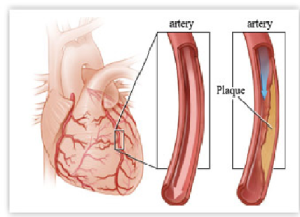Coronary Angiogram
Private Angiogram – Derby, Burton and Birmingham
The test involves the patient initially giving consent for the procedure, to ensure they understand the procedure and the risks involved. One of the doctors or nursing staff will place a cannula (drip) in the back of your hand or in your arm – just in case fluids of intravenous medications are required. Sedation can be given if required or felt appropriate. The patient is taken into the catheter lab (often shortened to ‘cath lab’) & asked to lay flat on their back on the cath lab table. There is a ‘camera’ above the table which will move around the patient to take pictures of the arteries from different angles.
The angiogram can be done through an artery in the wrist or in the groin. The route taken depends on the doctor performing the procedure, how easily the arteries are felt (previous operations or injuries could have damaged blood vessels) or if the patient has had a bypass operation before – in which case we would normally perform the procedure through the left wrist or groin as the bypass grafts are much easier to access.
The area to be used may need to be shaved and is then cleaned with special antiseptic fluid. The patient is covered with a sterile sheet and local anaesthetic injected into the area (usually the worst part of the procedure – you shouldn’t feel anything after the local anaesthetic). People are often worried about the wires or tubes floating about inside, but most people do not feel the wires or tubes inside them.

We then place a plastic tube called a sheath into the artery we are using & then use this to pass longer wires & plastic tubes called catheters into the artery up to the heart. The catheters have specific shapes which allow them to fit into the arteries of the heart. A special dye (clear when you look at it but shows up under x-ray) is injected into the heart arteries showing up any build of cholesterol (called plaques) & hence causing any narrowings or blockages.
These narrowings or blockages can then be treated with either medication, ballons & stents (angioplasty) or heart bypass surgery.
At the end of the procedure, all tubes are removed from within the arteries. The whole we have made for the procedure (2-3 millimeteres) is managed by either applying direct pressure for 20 mins (someone may literally push on the area). In the case of a wrist, a special strap may be place over the puncture site which then applies pressure via a small balloon filed with air or a small clamp. If the procedure was done via the groin, there are a number of devices that can be used to help seal this hole & allow the patient to get up & around much more quickly. You may occasionally be required to stop certain medications prior to this test – consult with your doctor before deciding to stop any medication yourself. Sometimes, patients are even advised to avoid eating or drinking anything for a certain period of time before the procedure is started. You will not be allowed to drive for 24 hours following an angiogram, we therefore ask someone to bring you for the procedure, collect you afterwards. We also advise that there is someone with you at home for 24 hours after the test. Though it is an invasive procedure, it is relatively safe and straightforward. Due to the contrast agent (dye) inserted into the arteries of the patient, allergic reactions may be provoked. As already mentioned, there is a 1 in 100 risk of bleeding & infection & 1 in 1000 risk of a stroke, kidney damage, heart attack or the patient requiring emergency open heart surgery. As the risks of the procedure are minimal, the pros significantly outweigh its cons making it an extensively used procedure in detecting heart diseases.
Book your Private Angiogram Today
If you need a coronary angiogram, then why not book an appointment with private cardiologist Dr Gill to ensure you receive the greatest possible treatment and care.
BOOK AN APPOINTMENT
Please call 01283 755556 or enter your details below & a brief summary of the problem & convenient days & times for you to see Dr Gill privately.
Patients can be seen in The Burton Clinic, Nuffield Hospital Derby & Spire Hospitals in Little Aston and Solihull.
How to contact me
Private Secretary: Emma Cope
admin@private-cardiologist.com
FIND LOCATION
Search location on google map
NEW PATIENT
Fill up all details in form to get started
SEND QUERIES
Send us your questions through mail
